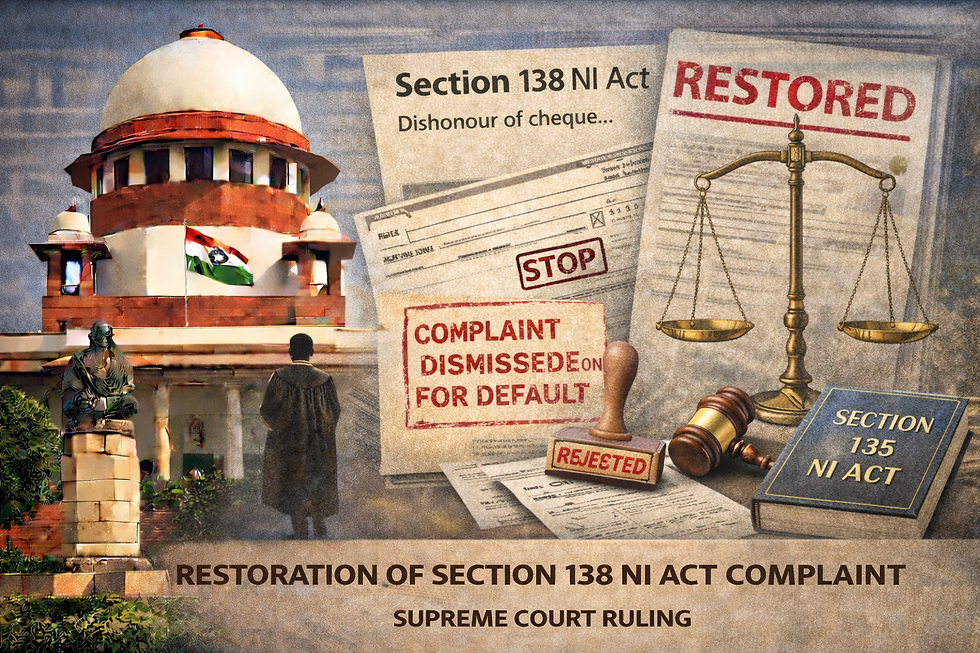Supreme Court Clarifies Interim Maintenance in Kiran Jyot Maini vs. Anish Pramod Patel
- Chintan Shah

- Jul 16, 2024
- 4 min read
Summary of the Judgment
Case Name: Kiran Jyot Maini vs. Anish Pramod Patel
Date: 15th July 2024
Judges: Honorable Justice Vikram Nath, Honorable Justice Prashant Kumar Mishra
Acts and Sections: Sections 498A, 323, 504 of Indian Penal Code, 1860 Sections 3, 4 of Dowry Prohibition Act, 1961 Section 12, Section 23, Section 31(1) of Protection of Women from Domestic Violence Act, 2005 Section 482 of Code of Criminal Procedure, 1973 Article 227 of the Constitution of India Section 17(1)(d) of the Special Marriage Act, 1954 Article 142 of the Constitution of India0
Cited Judgements: Hitesh Bhatnagar v. Deepa Bhatnagar (2011) 5 SCC 234 Ashok Hurra v. Rupa Bipin Zaveri (1997) 4 SCC 226 Shilpa Sailesh v. Varun Sreenivasan (2022) 15 SCC 754 Vinny Paramvir Parmar v. Paramvir Parmar (2011) 13 SCC 112 Vishwanath Agrawal v. Sarla Vishwanath Agrawal (2012) 7 SCC 288 Rajnesh v. Neha and Another (2021) 2 SCC 32 Manish Jain v. Akanksha Jain (2017) 15 SCC 801 Shailja & Anr. v. Khobbanna (2018) 12 SCC 199 Sunita Kachwaha & Ors. v. Anil Kachwaha (2014) 16 SCC 715
Introduction
The Supreme Court of India's decision on 15th July 2024, in the case of Kiran Jyot Maini vs. Anish Pramod Patel, addresses a multifaceted legal battle encompassing interim maintenance, allegations of cruelty, and the dissolution of marriage on grounds of irretrievable breakdown. This judgment, delivered by Honorable Justice Vikram Nath and Honorable Justice Prashant Kumar Mishra, is significant for its in-depth analysis and application of various legal principles.
Background
The appellant, Kiran Jyot Maini, married the respondent, Anish Pramod Patel, on 30th April 2015. The marriage quickly deteriorated, leading to the registration of an FIR within a year on 13th April 2016 under sections 498A, 323, 504 of IPC, and sections 3, 4 of the Dowry Prohibition Act. The appellant subsequently sought interim maintenance under the Protection of Women from Domestic Violence Act, 2005 (PWDV Act).
Proceedings and Interim Maintenance
Initial orders for interim maintenance were granted by the Judicial Magistrate, Gautam Budh Nagar, and later modified by the Additional Sessions Judge. Despite several attempts at mediation and multiple legal challenges, the respondent's compliance with interim maintenance orders was inconsistent. The appellant's petitions for attachment of the respondent's bank accounts and full payment of arrears were partially addressed by the Delhi High Court, leading to further appeals.
Supreme Court's Observations
1. Irretrievable Breakdown of Marriage: The Court acknowledged the irretrievable breakdown of the marriage, citing the long-standing separation, failed mediation attempts, and multiple litigations. The Court referenced significant precedents like Hitesh Bhatnagar v. Deepa Bhatnagar and Ashok Hurra v. Rupa Bipin Zaveri to justify dissolving the marriage under Article 142 of the Constitution of India.
"A marriage can be dissolved by the courts on the grounds of irretrievable breakdown of marriage only when it appears that it has become impossible to save the marriage, all efforts for reunion have failed, and the Court is convinced beyond any reasonable doubt that there are no chances of the marriage surviving and succeeding."
2. Determination of Maintenance: The judgment elaborated on the principles for determining maintenance, drawing from cases like Vinny Paramvir Parmar v. Paramvir Parmar and Rajnesh v. Neha and Another. The Court highlighted factors such as the income and properties of both parties, their conduct, status, personal needs, and the capacity to maintain dependents.
3. One-Time Settlement: Given the contentious nature of ongoing maintenance payments, the Court decided on a one-time settlement. The appellant had demanded Rs. 5 to 7 Crores, while the respondent offered Rs. 50 Lakhs. The Court settled on Rs. 2 Crores, considering the parties' financial status, obligations, and the need for a fair and balanced resolution.
"Keeping in view the totality of the circumstances, the social and financial status of the parties, their current employments as well as future prospects, standards of living, and their obligations, liabilities, and other expenses, a one-time settlement amount of Rs. 2 Crores would be a balanced and fair amount."
Judicial Sensitivity and Equitable Relief
The Court's sensitivity to the prolonged suffering and financial uncertainty faced by the appellant is commendable. The judgment balances legal principles with humane considerations, ensuring that the appellant's financial and emotional well-being is safeguarded. This balanced approach exemplifies the judiciary's role in providing not just legal but also equitable relief.
Application of Article 142
The invocation of Article 142 to dissolve a marriage on the grounds of irretrievable breakdown is particularly significant. This provision allows the Supreme Court to do "complete justice" in a case, providing a legal mechanism to resolve cases that otherwise might remain unresolved due to rigid statutory provisions. The judgment serves as a reminder of the Court's broad powers and its willingness to exercise them to achieve just outcomes.
Legal Implications
This judgment is instructive for legal professionals in India, particularly in matters of matrimonial disputes involving maintenance and the dissolution of marriage. It underscores the judiciary's approach to balancing the interests of both parties while ensuring a fair resolution.
Key Takeaways
The judiciary's discretionary power under Article 142 to dissolve marriages on the grounds of irretrievable breakdown.
The detailed framework for determining maintenance, emphasizing the need for a balanced and fair assessment of both parties' financial circumstances.
The importance of one-time settlements in protracted matrimonial disputes to provide a clear and conclusive resolution.
Conclusion
The Supreme Court's judgment in Kiran Jyot Maini vs. Anish Pramod Patel is a landmark decision that reinforces the principles of fairness and equity in matrimonial disputes. By addressing the complexities of interim maintenance and the dissolution of marriage, the Court has provided a comprehensive legal precedent that will guide future cases. Legal professionals in India must take note of this judgment for its detailed analysis and application of relevant legal principles.



Comments